|
|
|
Sort Order |
|
|
|
Items / Page
|
|
|
|
|
|
|
| Srl | Item |
| 1 |
ID:
176029


|
|
|
|
|
| Summary/Abstract |
One of the most contested arguments in contemporary just war thinking has been the question of the right starting point of analysis. On one side of the argument, one finds Catholic Church officials who argue for a ‘presumption against war’ as jumping-off point. On the other, one encounters critics of that position, led by James Turner Johnson, who defend a ‘presumption against injustice’ as the correct point of entry. Interestingly, both sides refer to St Thomas Aquinas, the key figure in the systematisation of the classical just war, as giving support to their respective position. While Johnson was vindicated as far as Aquinas’s historical starting point is concerned, debate about the contemporary purchase of the presumption against war has continued until the present day. Historical just war thinkers like Johnson have criticised the Church not only for turning the logic of the just war tradition on its head by reversing the inherited hierarchy between the so-called deontological and prudential criteria, but have also questioned the empirical evidence that has put the Church on this trajectory. In this article, I explain how the debate about the presumption against war continues to be relevant by engaging with the general direction the Catholic Church has taken up until Pope Francis and by investigating the particular example of its position on drone warfare. I point out that while the presumption against war runs counter to what Aquinas wrote during his days, Thomistic virtue ethics is generally open to development. The Church may thus claim a Thomistic patrimony in advocating for a presumption against war, but, as I demonstrate, the just war thinking that results, often referred to as modern-war pacifism, struggles to address important moral issues raised by contemporary warfare.
|
|
|
|
|
|
|
|
|
|
|
|
|
|
|
|
| 2 |
ID:
119436
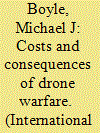

|
|
|
|
|
| Publication |
2013.
|
| Summary/Abstract |
One of the distinctive elements of President Barack Obama's approach to counterterrorism has been his embrace of Unmanned Aerial Vehicles (UAVs), or drones, to target terrorist operatives abroad. The Obama administration has used drones in active theatres of war, such as Afghanistan, but it has also dramatically increased the number of drone attacks launched by the CIA in other countries, such as Pakistan, Yemen and Somalia. The conventional wisdom on drone warfare holds that these weapons are highly effective in killing terrorist operatives and disabling terrorist organizations, while killing fewer civilians than other means of attack.
This article argues that much of the existing debate on drones operates with an attenuated notion of effectiveness that discounts the political and strategic dynamics - such as the corrosion of the perceptions of competence and legitimacy of governments where drone strikes take place, growing anti-Americanism and fresh recruitment of militant networks - that reveal the costs of drone warfare. Focusing particularly on drone use in Pakistan, Yemen and Somalia, the article suggests that the Obama administration's counterterrorism policy operates at cross-purposes because it provides a steady flow of arms and financial resources to build up governments whose legitimacy it systematically undermines by conducting unilateral strikes on their territory.
It concludes that the US embrace of drone technology is a losing proposition over the long term as it will usher in a new arms race and lay the foundations for an international system that is increasingly violent, destabilized and polarized between those who have drones and those who are victims of them.
|
|
|
|
|
|
|
|
|
|
|
|
|
|
|
|
| 3 |
ID:
183728
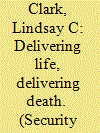

|
|
|
|
|
| Summary/Abstract |
Like all warfare, drone warfare is deeply gendered. This article explores how this military technology sediments or disrupts existing conceptualizations of women who kill in war. The article using the concept of motherhood as a narrative organizing trope and introduces a ‘fictional’ account of motherhood and drone warfare and data from a ‘real life’ account of a pregnant British Reaper operator. The article considers the way trauma experienced by Reaper drone crews is reported in a highly gendered manner, reflecting the way women’s violence is generally constructed as resulting from personal failures, lost love and irrational emotionality. This irrational emotionality is tied to a long history of medicalizing women’s bodies and psychologies because of their reproductive capacities and, specifically, their wombs – explored in this article under the historico-medical term of ‘hysteria’. The article argues that where barriers to women’s participation in warfare have, in the past, hinged upon their (argued) physical weakness, and where technology renders these barriers obsolete, there remains the tenacious myth that women are emotionally incapable of conducting lethal operations – a myth based on (mis)conceptions of the ‘naturalness’ of motherhood and the feminine capacity to give life.
|
|
|
|
|
|
|
|
|
|
|
|
|
|
|
|
| 4 |
ID:
147903
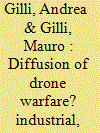

|
|
|
|
|
| Summary/Abstract |
Many scholars and policymakers are concerned that the emergence of drone warfare—a first step toward the robotics age—will promote instability and conflict at the international level. This view depends on the widely shared assumption among International Relations scholars that military hardware spreads easily, especially in the age of globalization and real-time communications. In this article, we question this consensus. Drawing from the literature in management, we advance a new theory of diffusion of military innovations and test its two underlying causal mechanisms. First, we argue that designing, developing, and manufacturing advanced weapon systems require laboratories, and testing and production facilities, as well as know-how and experience that cannot be easily borrowed from other fields. Second, we argue that the adoption of military innovations requires both organizational and infrastructural support. We test our two claims on three types of combat-effective drones: loitering attack munitions (LAMs), intelligence surveillance and reconnaissance drones (ISR), and unmanned combat autonomous vehicles (UCAVs). We find that even wealthy, advanced, and militarily capable countries such as the United States, the United Kingdom, Germany, and France have struggled to produce or adopt such platforms. We conclude that concerns about the diffusion of drone warfare appear significantly exaggerated, as do claims that globalization redistributes military power at the global level. More generally, our analysis sheds light on how the interaction between platform and adoption challenges affects the rate and speed of diffusion of different military innovations.
|
|
|
|
|
|
|
|
|
|
|
|
|
|
|
|
| 5 |
ID:
122849
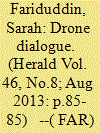

|
|
|
| 6 |
ID:
176030
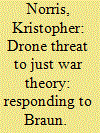

|
|
|
|
|
| Summary/Abstract |
In this response to Christian Braun’s article in this journal, I argue that the rise of drone warfare against terrorism suggests the necessity of the presumption against war (not its limit) and use the issue to advance this broader debate within just war theory at a pivotal moment in the tradition.
|
|
|
|
|
|
|
|
|
|
|
|
|
|
|
|
| 7 |
ID:
158579
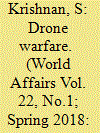

|
|
|
|
|
| Summary/Abstract |
S Krishnan details the justifi cations provided by the US for using drones even in areas where it is not formally at war and where such attacks are carried out by the CIA, a civilian agency. He avers that Washington is in breach of the laws of war, regardless of whether killing combatants by remote controlled weapons is morally acceptable and less likely to cause civilian casualties than conventional military action.
|
|
|
|
|
|
|
|
|
|
|
|
|
|
|
|
| 8 |
ID:
144309
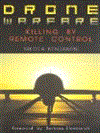

|
|
|
|
|
| Publication |
Noida, HarperCollins Publishers India, 2012.
|
| Description |
ix, 241p.pbk
|
| Standard Number |
9789350299913
|
|
|
|
|
|
|
|
|
|
|
|
Copies: C:1/I:0,R:0,Q:0
Circulation
| Accession# | Call# | Current Location | Status | Policy | Location |
| 058611 | 358.4/BEN 058611 | Main | On Shelf | General | |
|
|
|
|
| 9 |
ID:
121505
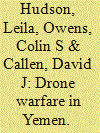

|
|
|
| 10 |
ID:
176031
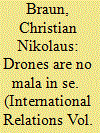

|
|
|
|
|
| Summary/Abstract |
This short essay responds to Kristopher Norris’s reply to my article entitled ‘The Catholic Presumption against War Revisited’. It engages with Norris’s three main points of critique.
|
|
|
|
|
|
|
|
|
|
|
|
|
|
|
|
| 11 |
ID:
145972
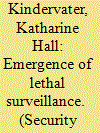

|
|
|
|
|
| Summary/Abstract |
This article examines the history of the development of drone technology to understand the longer histories of surveillance and targeting that shape contemporary drone warfare. Drawing on archival research, the article focuses on three periods in the history of the drone: the early years during World Wars I and II, the Cold War, and the 1990s. The history of the drone reveals two key trends in Western warfare: the increasing importance of intelligence, surveillance, and reconnaissance (ISR) and the development of dynamic targeting. These trends converge today in a practice of lethal surveillance where ISR capabilities are directly linked to targeted killing, effectively merging mechanisms of surveillance and knowledge production with decisions on life and death. Taking this history of lethal surveillance into account not only reframes current debates on drone warfare, but also connects the drone to other practices of security and control.
|
|
|
|
|
|
|
|
|
|
|
|
|
|
|
|
| 12 |
ID:
192703


|
|
|
|
|
| Publication |
New Delhi, Sabre and Quill Publishers, 2024.
|
| Description |
216p.hbk
|
| Standard Number |
9788119509539
|
|
|
|
|
|
|
|
|
|
|
|
Copies: C:1/I:0,R:0,Q:0
Circulation
| Accession# | Call# | Current Location | Status | Policy | Location |
| 060477 | 327/SRI 060477 | Main | On Shelf | General | |
|
|
|
|
| 13 |
ID:
147553
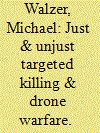

|
|
|
|
|
| Summary/Abstract |
Targeted killing in the “war on terror” and in war generally is subject to familiar and severe moral constraints. The constraints hold across the board; they don't change when drones are the weapon of choice. But the ease with which drones can be used, the relative absence of military risks and political costs, makes it especially tempting not only to use drones more and more, but also to relax the constraining rules under which they are used. It seems clear that the rules have, in fact, been relaxed in the course of the American experience with drone warfare – by presidential decision and without public debate. This essay is an argument for the opening up of the decision process to democratic scrutiny and in defense of the familiar constraints.
|
|
|
|
|
|
|
|
|
|
|
|
|
|
|
|
| 14 |
ID:
171597


|
|
|
| 15 |
ID:
103240


|
|
|
| 16 |
ID:
130952


|
|
|
|
|
| Publication |
2014.
|
| Summary/Abstract |
It is clear the United States and other major powers see drone warfare as the wave of the future. Today more than 70 countries possess drone technology and many others are seeking to acquire it. It is expected that within 20 years, there will be swarms of drones and many autonomous fighters and bombers in use around the globe. If the trends continue as anticipated, these drones will usher in a 'boundless and borderless war without end'. The development of technological improvements will eventually lead to a militarisation of foreign policy and unnecessary conflicts. While the circumstances in Pakistan are unique, the questions surrounding the US drone programme in non-combat zones such as Pakistan raise important issues regarding how drone use should be governed in the future. This article is an attempt to analyse legal and ethical issues raised by the US use of drone technology in non-combat zones such as Pakistan, and it looks into its underpinnings and also its repercussions as tool in prospective warfare.
|
|
|
|
|
|
|
|
|
|
|
|
|
|
|
|
|
|
|
|
|